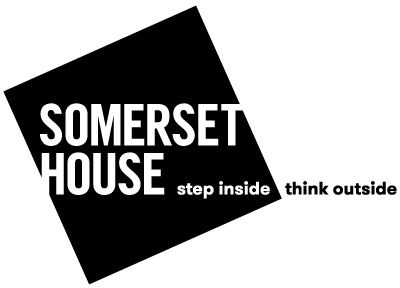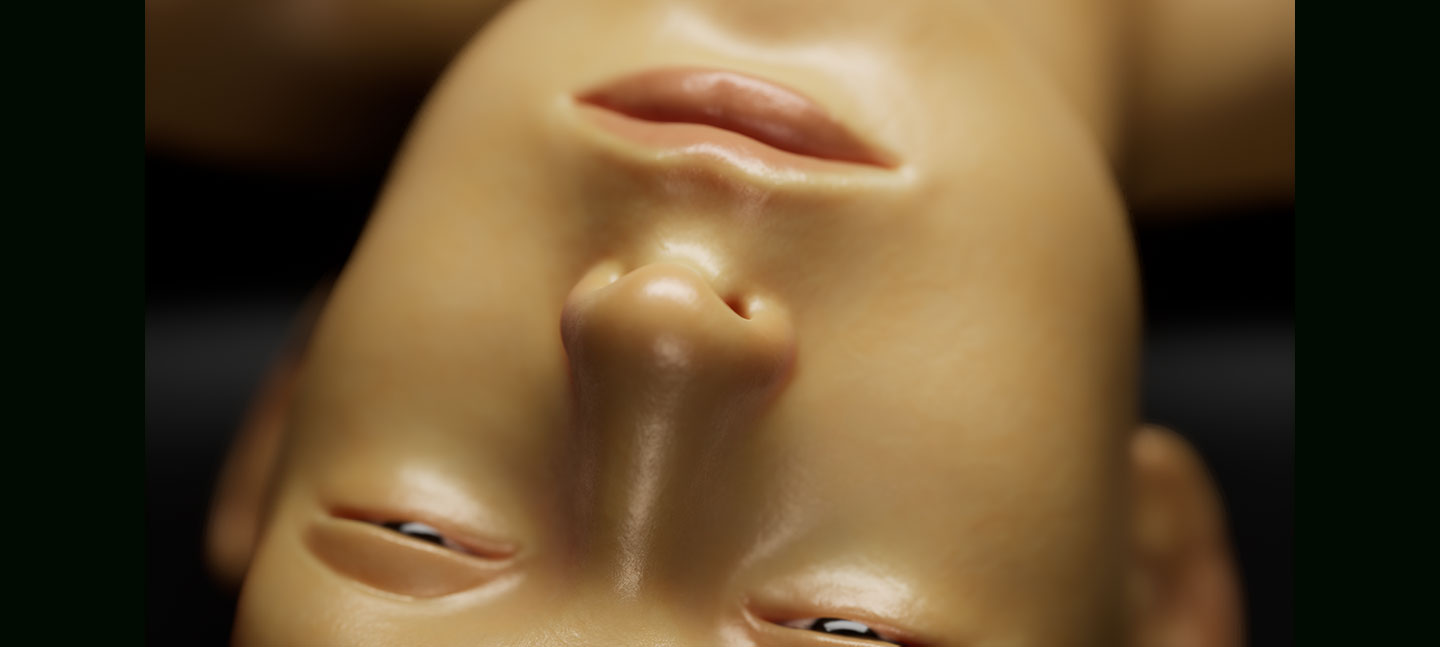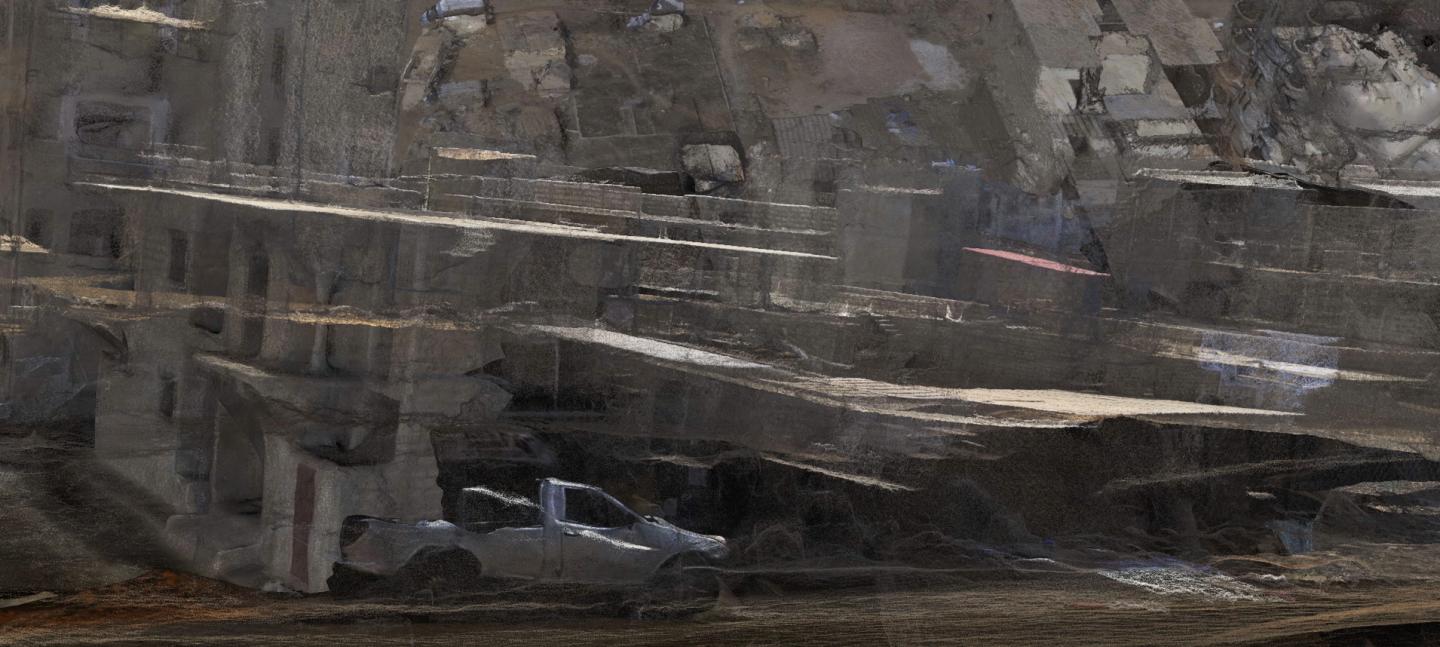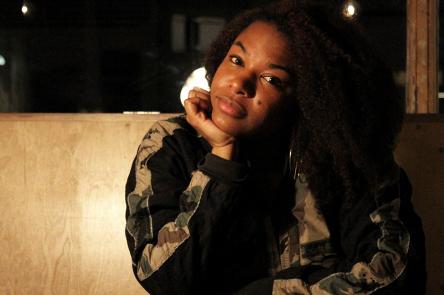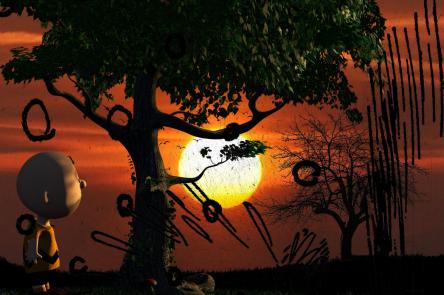
With a hip-hop installation about algorithmic electioneering, and a film about the last human rights activist in the UAE on the horizon, Somerset House Studios resident Manu Luksch asks vital questions about the effects of emerging technologies on daily life, social relations, urban space, and political structures.
Manu Luksch has an eye for the eerie, culverted, and insidious aspects of technology: how surveillance is choreographing our movements, how algorithms modify our behaviours, and how our futures are predicted. She is compelled by a sense of responsibility: to be someone making a change rather than simply commenting on a phenomenon, after all the extent of companies’ social listening, data harvesting, and user analysis is so enormous and so complex that for most it appears far too opaque to bother interrogating.
Most of her films, which are often also performances or multi-part, intermedia projects, interrupt this externally imposed apathy and alchemize it into political action. In her 2008 film Mapping CCTV in Whitehall, Luksch maps the cameras around Whitehall within a zone covered by SOCPA (Serious and Organized Crime and Police Act 2005). ‘I’m an artist’ she says in the first half of video and only later do we understand this as a response to police questioning. In the second half, she mapped the range of camera no. 40 Villiers St. By intercepting its signal, which was transmitted wirelessly without encryption, she was able to map with white tape the zone in which members of the public were filmed. As each passerby entered the filmed area, she alerted them to the existence of the camera and handed them the map of CCTV cameras in Whitehall.
BBD_Dubai3.jpg

Similarly, her forthcoming feature film The Billion Dollar Dissident interrogates the fantasy of the UAE’s hi-tech, smart cities and their violent underpinnings – including repression of dissenting citizens. Tall glass skyscrapers appear to have emerged from the sand: futuristic and weightless, analogues of the frictionless economy created behind the glass. But their transparency outwith conceals the opacity of their internal workings where business is brokered on a political level and politics is brokered on a business level. The UAE is a hereditary sheikhdom, lacking an independent judiciary, democracy, freedom of speech and a place in which dissent is met with ‘disappearance.’
Her methodology often involves an interplay between documentary and fiction, which she also applied for ALGO-RHYTHM, a project that calls attention to the threats posed to human rights by the rise of algorithmically-managed societies. Showing this winter at Privacy Salon's Computers, Privacy and Data Protection (CPDP) conference, Brussels, and FAME 2019, Paris, ALGO-RHYTHM was made with rappers in Senegal engaged in a long tradition of hip hop as resistance, a musical installation drawing on voter micro-targeting strategy such as practiced by Cambridge Analytica, that looks beyond the sleek, slick convenience of smartphones to ask: how is personal data being used, misused and abused by corporations and governments? As in the 2011 elections in Senegal where rappers formed a group seeking to speak truth to power about the controversial and illegal activities of the president Abdoulaye Wade, ALGO-RHYTHM uses drama and music to articulate hopes and fears around new data technologies in advance of the presidential election this year.
algorhythm_baila.jpg

What do you do and why?
[Laughter] I ask myself this every day. I am motivated by the questions I am asked by my surroundings.
Cryptic. Say more.
It begins when I stumble across something that’s becoming part of our daily lives by promising convenience or efficiency, but which has a concealed mission or function. Questions and doubts grow, and there’s a thread to unravel. Google search is an obvious example – it’s now seen as a basic utility, but under the hood it’s a tool of mass network surveillance. A smartphone is also a psychometric analysis device and health sensor that plays a huge role in the classification and commodification of personal data,. A lot of my concerns revolve around how such technologies are interwoven with individual lives and material space, and how this impacts notions of freedom, autonomy, and privacy.
‘Why’ is easier! I make the work so I don’t become alienated. If I don’t find ways to relate to the deeper environment, I find myself in a dark mood.
A dark mood?
Yes. Combing through the small print of our Faustian pact with communication technologies allows me to reclaim spaces for intervention, participation, change and ultimately to fight alienation (and resignation).
While you’re in residence at Somerset House Studios you’re producing a tactical fiction installation piece — can you tell me more about the term tactical fiction.
‘Tactical’ thinking, the little sister of ‘strategy’ operates during the very situation it searches to affect, it employs the means available in that moment, translates the critique into intervention, reclaims participation and exercises direct democracy. Fictionalization of a situation provides the necessary distance from the all too familiar, and allows for thought experiments to be imaginatively scaled up and elaborated, eventually even provides the means for them to be reabsorbed back into real life.
What appeals to you about that?
Tactical fiction is a powerful artistic strategy for rethinking the status quo, inviting a wider audience into it. By creating myths and tales around existing objects, processes or environments, we can provoke and share visions of alternative futures. It’s a great way for creatively challenging what we find less than perfect in our world, for combining the political with the imaginary. We need to properly grasp our situation – the environment that we take for granted – and playing the concepts of ‘fiction’ and ‘document’ off against each other helps to do this. In my latest work, for example, I use this approach to highlight the contradictions of informational capitalism and expose its faultlines.
What is your latest project?
I’m working with hip hop artists in Senegal to develop a musical installation about algorithmic electioneering, such as the psychometric micro-targeting carried out by Cambridge Analytica during election campaigns in the US, Kenya and Nigeria, and the ‘Brexit’ referendum in Britain. Although Cambridge Analytica collapsed following public exposure of their practices in the mainstream media, and Facebook, which was also implicated, issued a pathetic apology, there hasn’t been a drastic change in regulation or oversight, and elections around the world are still vulnerable to such interference.
I sought a collaboration with rappers because of the tradition of performing political critique from the earliest days of hip hop, and even further back, to the traditional Senegalese recitation of Tassou (which also features in the work).
In the 2011 elections in Senegal, then president Abdoulaye Wade wanted to extend his term by changing the constitution that sets a limit of two presidential terms. The hip hop community were crucial in the formation of the political movement Y’En A Marre (“Fed Up”), taking the message to the streets and mobilising resistance.
algorhythm_MrX2.jpg

And now that Wade isn’t president…?
There has already been protest in advance of the 2019 election, because of a new law that requires candidates to collect supporting signatures of one percent of registered voters in each of Senegal’s regions, which forecloses the opportunity for minor candidates to run, let alone win.
These musicians act as a kind of unbribable watchdog, who don’t get co-opted but keep scrutinizing the process. They are very interested in understanding the latest methods on influencing voters’ decision making process considering the hijacked elections in other African countries like Kenya and Nigeria. Some see Cambridge Analytica’s meddling as a new form of corporate colonialism, others raise the urgent question if this is even the end of democracy?
So your project comes out of a critique of the world of global capital and ‘big data and is applied to the specific Senegalese context’?
Yes – ALGO-RHYTHM, which is part of a larger work, asks broad questions about the human impact of ‘smart’ tech: who owns the future? who predicts best? who knows us ‘better than we know ourselves’? and how can we reclaim our psychological and emotional autonomy? But though the target audience is global, the characters, language, and locations will resonate particularly strongly in Senegal.
How did you meet the rappers?
I am currently on a Human Rights Fellowship with the Open Society Foundation, during which I’m exploring ethical issues raised by algorithmic decision making. The Foundation brought the Fellows to a meeting in Dakar for four days.
That’s not long!
No, and I dislike going on long distance trips for such short periods. I planned to extend my stay and conduct some aspects of my research there, to avoid a Euro or US-centric narrative. A Senegalese filmmaker in London introduced me to Xuman, an incredibly original and well-respected voice in the hip hop scene of Dakar, and he very generously helped to put the cast together.
So I ended up in Dakar over Easter with my two children who were on holiday from school, my partner and collaborator Mukul, and other team members from Berlin.
That’s quite a cool Easter holiday, did your kids enjoy it?
It was actually a really exhilarating adventure, from the start. We were staying on an idyllic island, three minutes by boat from mainland Dakar. But when we arrived, we couldn’t find a pier – we had to roll up our trousers and walk through the crashing waves, holding our children and hauling cameras, laptops and synthesizers above our heads, to clamber into a small wooden boat. And all of this with only the moon for light. Everyone was excited. My older son is 12 and is always making things. He ended up doing 3D photogrammetry scans of all the rappers for us!
That sounds extraordinary. I would have loved to have learnt about filmmaking when I was a kid.
Location scouting can be seen as an alternative form of sightseeing, I guess! I like my kids being involved even if it means sacrificing a tight production schedule. I want to pursue a way of life with them that’s inclusive, encourages their curiosity and opens up formal learning to experiences outside the box.
I’m also working on another feature length film, which challenges the promises and conveniences of smart technologies on an urban scale.
BDD.jpg

The idea of urban infrastructure changing according to smart technology is something that comes up in your upcoming film Billion Dollar Dissident.
Yes, I was filming in the UAE because Dubai and Masdar are cutting edge case studies as emerging ‘Smart Cities’. While it was incredibly difficult to get access to key players in government and business and to capture on film how they were involved in the creation of the smart city, it seemed literally impossible to speak to a common inhabitant or interface user. I tried all I could but I couldn’t get any Emirati to speak to me on film.
At the last minute was introduced to Ahmed Mansoor, also known as ‘the last human rights activist in UAE’, as global media commonly refers to him. So not an ordinary user at all, but of course I took up this incredible opportunity!
10 months later he was arrested and sentenced to ten years imprisonment. For a tweet.
That’s awful.
It was a huge shock for me to picture him back in prison. During our filmed conversation, Ahmed had described the nightmarish conditions of his first imprisonment in the context of the Arab Spring.
When press and politicians in the UK remained surprisingly silent over Ahmed’s arrest, despite his prominent position as Martin Ennals Award recipient, and despite ongoing investment deals and military exports brokered by highest British political ranks, it led me to dig much deeper into UAE-UK relationships. The Billion Dollar Dissident will speak about expensive spyware exports, the forces behind the world’s most successful football club, and Happiness as political agenda, amongst other things.
The smart city, once symbol of progress, is now a troubled model that’s deeply imbricated with increase of governmental-corporate power relations and centralised ideas around the governance of data. When did your sceptic view on network politics emerge?
I feel that the fact that I remember a time before Internet and can see the difference between pre-Internet and post-Internet, puts my generation in an interesting position.
Inevitably, I was very enthusiastic about the possibilities that the emerging world wide web offered. In 1996 when I took the role as artistic director of the MedienLabor München, one of the pioneering public media labs, I invited gray-hat hackers and night owls into the computer lab. They introduced me to critical questions about ownership of networks, their increased commercialization, the positive and dark sides of anonymous communication, and so on, long before the events around 9/11 shifted the balance, use and perception of data networks towards mass surveillance.
algorhythm_cubecity.jpg

Can you tell me a little bit about the parallels you found between contemporary fears around tech and social media and historic fears around the phone?
I explored this in my feature film Dreams Rewired. My lead question was why are we so committed to being hyper-connected in a post-Snowden revelation world? Together with my codirectors, Martin Reinhart and Thomas Tode, I researched recordings of our first encounters with media technology. To trace back the public imagination of information technologies, I used rare, often yet unseen film footage from over 200 films from the 1880s to the 1930s.
We argue that the main concepts emerged during the electric media boom of the late 19th century. For example, you can see how the early motion studies by Étienne-Jules Marey are precursors of the current race in predictive analytics. This kind of footage is spliced together with a commentary on our contemporary predicament voiced by Tilda Swinton that, rather than plunging the audience into the past, pulls the historical material into the present.
But the promises of radical openness were not fulfilled, as emerging technologies keep getting consolidated and regulated as soon as they gather momentum. Is it really an unavoidable spiraling development that we are stuck in? Peer-to-peer communication gives way to centralised broadcasting, erosion of privacy, and accumulation of media power in the hands of a few keep retuning.
I am reluctant to ask about hope or redemption in this context, but I do wonder about reclaiming... do you think it’s possible?
It’s difficult … but new initiatives do emerge underneath: there was a lot of speculation how cryptocurrencies might lead to new economic models, there is the MAZI Zones initiative here in London that develops highly configurable local community networks, and there are alternative satellite projects.
Satellite projects?
Recently, I was invited to join a future city lab in South Korea. One of the participants, an international space expert who works on a diverse, entrepreneurial space ecosystem, showed me DIY satellite projects, and how to launch your own satellite and how people are using it.
Human trafficking is rife in the fishing industry, and a lot of the boats in the waters around Thailand are crewed by people who have been forced into the work and without any recourse or escape.
Independent satellites can pinpoint sea trawlers in the ocean, cross check the vessels’ movements with the log books they’re required to fill in at each harbour, and if the satellite data shows they never go to harbour then it’s very likely that they’re keeping the fishermen captive. And so the satellite data can be used to alert the right authorities and (hopefully) help abolish this modern day slavery.
So… yes, new forms of connectivity and with them new ways of interaction keep opening up. If they don’t exist yet, let’s imagine them – it’s this kind of dance between the arts and technologies, between fact and fiction, that I find addictively compelling.
Interview by Cornelia Prior for Somerset House Studios
